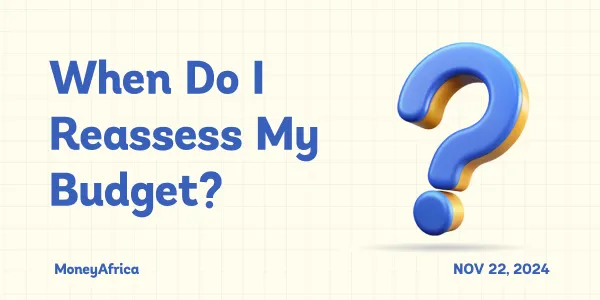A monthly budget is a powerful tool for managing your finances, but it’s not a “set it and forget it” kind of thing. Just like you revisit your career goals or update your wardrobe for new seasons, your budget needs regular check-ins to stay relevant. Whether your circumstances have changed or your goals have shifted, reassessing your budget ensures you are using your resources effectively. Here is when you should take a closer look.
1. An Increase in Income
Receiving a raise or finding an additional income source is exciting—and it’s the perfect reason to revisit your budget. Without a plan, extra money can easily disappear into spontaneous spending rather than meaningful progress toward your financial goals.
Instead, take this opportunity to:
- Increase your savings contributions (e.g. build your emergency fund or boost retirement savings).
- Tackle debt faster by directing more toward loans or credit cards.
- Allocate for personal enjoyment while keeping it reasonable.
Think of it as a chance to balance enjoying today and preparing for tomorrow. Adjusting your budget ensures every naira works hard for you.
2. Pursuing New Financial Goals
Financial goals often evolve over time, and your budget should evolve with them. Whether you’re planning to purchase a car, start a business, or save for a vacation, aligning your budget with these goals is essential.
For example:
- Saving for a car? Allocate a portion of your monthly income to a dedicated fund.
- Planning a vacation? Start trimming discretionary spending like dining out or entertainment.
- Aiming for long-term growth? Begin setting aside funds for investments.
Your goals act as the compass for your financial decisions. Reworking your budget ensures you are moving steadily in the right direction.
3. Life Has Thrown You a Curveball
Major life changes often come with financial adjustments. Events like marriage, having children, relocating, or starting a new job can significantly impact your income, expenses, or priorities. These shifts require your budget to adapt accordingly.
- Marriage: You may need to merge finances, agree on joint goals, and share expenses.
- Parenthood: From baby essentials to long-term savings, new expenses will need careful planning.
- Relocation: Moving can introduce changes in rent, utilities, or even commuting costs.
Ignoring these changes can lead to financial imbalance. Taking time to revise your budget ensures you are prepared for new responsibilities.
4. Consistently Overspending
If you find yourself exceeding your budget regularly, it is a clear signal that something isn’t working. Overspending might indicate that your original budget was unrealistic or that your spending habits have shifted.
Here is how to address it:
- Track your spending:Look closely at where your money is going.
- Reallocate funds: Increase limits in areas where spending tends to go over (like groceries or transportation).
- Cut back on extras: Identify areas where you can save, like subscriptions or luxury purchases.
Remember, a budget is meant to reflect reality, not an idealised version of your finances. If adjustments are needed, don’t hesitate to make them.
How to Reassess Effectively
Reassessing your budget doesn’t have to be complicated. Start by reviewing your financial situation—your income, expenses, goals, and recent life changes. Ask yourself:
- Are my current savings and spending allocations realistic?
- Have my priorities or circumstances changed?
- What areas need more focus or adjustment?
Then, update your budget to reflect these insights. Tools like budgeting apps or simple spreadsheets can make this process smoother and more transparent.
Your budget should be as dynamic as your life. By reassessing it when your income increases, your goals shift, or your circumstances change, you ensure it remains a useful tool for managing your money effectively.
Think of your budget as a financial checkup—it’s not just about fixing problems but about optimising what’s working well. Regularly reviewing and adjusting it helps you stay on track, no matter what life throws your way.
***
Do you know that we have our own podcast? It’s MONEYTALKS!💚
Here’s a link to listen to all the amazing episodes we have!
***
Thank you for reading Money Africa’s Blog.
Please feel free to share it.
Do you have any questions? You can send an e-mail to info@themoneyafrica.com or send a DM to any of our social media channels.
***
MoneyAfrica premium plan
Are you a mid to high-income earner? Do you find communities a bit too busy? You should sign up for our premium plan.

You can learn more about that here.
***
We often get questions regarding how to plan your finances to align with your relocation plans, especially for students seeking to further their studies. As always, we have heard you, and we have put together an e-book to help you navigate this. Follow this link, to get your FREE copy of the e-book: The Japa Encyclopedia.
***
Get our annual subscription and learn more about investing safely and building a solid portfolio in 2024.
Don’t forget to:
- Join our community, if you want to smash your 2024 financial goals. It takes at least 30 days to build great habits that will last you a lifetime. So why not start now? There is a lot you can achieve.
- If you would like to document your financial journey in 2024, then our journal would be an excellent fit for you. It costs ₦7,500 (excluding delivery).
- Get a budget sheet to track your monthly expenses. Click here
- Get an investment tracker to be on top of all your investments. Click here
MoneyAfrica is a financial literacy platform. Our goal is to make everyone better with their finances.
We do this by engagements via our:
– social media handles
– platforms for paid community members (for adults and students)
– webinar sessions with corporate clients
Would you like to join any of the communities? Please click here
Would you like us to hold a webinar for your company’s staff? Please send an email to info@themoneyafrica.com


